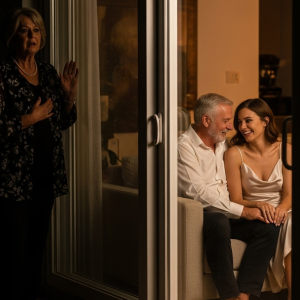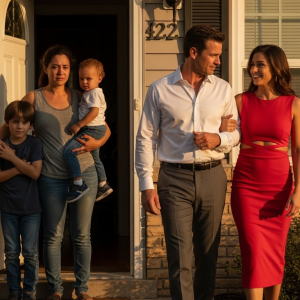I used to believe that raising children was about passing down love. Now, at 66, I’ve realized sometimes it’s just preparing for the day you’ll need to defend yourself from their schemes.
That thought lodged in my chest the afternoon my daughter-in-law, Heather, didn’t call or text. She simply brought her parents from their small town and moved them straight into what used to be my master bedroom. She announced it as casually as the weather.
“Mom, we’ll have you move into the guest room,” she beamed, as if bestowing a great blessing. “My parents are getting older and their joints aren’t great. The master gets better light. It’s healthier for them.”
I stood in the middle of the living room, an intruder in the house I had paid for. The sun poured through the windows, soft and golden, but did nothing to thaw the ice forming in my chest. I looked at the bedroom that had been my sanctuary, now cluttered with unfamiliar suitcases and gaudy linens. Then my eyes drifted to the so-called guest room, my furniture shoved into corners, my late husband’s favorite wicker chair jammed against a wall, teetering.
I didn’t yell. I didn’t cry. Arguing with someone like Heather is pointless. As for Daniel, my son, who followed his wife’s lead on everything, confronting him would only lead to his humiliation, which would inevitably backfire on me.
That afternoon, while the four of them napped on the sectional sofa, I quietly packed a small suitcase. They probably assumed I was sulking, that after a few days I’d come slinking back to resume my role as their unpaid nanny and emergency ATM. How laughable. My name is Grace Monroe, and I have spent a lifetime teaching structure, boundaries, and respect. They had gravely underestimated me.
My husband passed away a few years ago. I could have lived alone, but I chose to move in with Daniel and Heather, thinking I could help. I carried that household—cooking, cleaning, watching my grandson, Lucas. In return, I received Heather’s sugar-coated condescension.
“Mom, the food’s a bit salty,” she’d say with a smile, before ordering Lucas a pile of greasy fried chicken. “Oh my gosh, these reading glasses are so outdated,” she’d laugh, promising a shopping trip that never materialized. I swallowed it all to keep the peace, because the deed to this three-bedroom house, bought with the savings my husband and I scraped together for decades, was in my name alone.
About a month ago, Heather began planting the seeds. “My parents’ house is practically falling apart,” she’d sigh. “I was thinking maybe they could stay with us for a while.”
I tried to be gentle. “Heather, we’re already tight on space. Where would they even sleep?”
She just smiled a tight little smirk and ignored me. Now, here they were.
As I stood in the guest room, surrounded by the chaotic mess of my displaced life, Daniel hovered at the door. “Mom, please don’t take it the wrong way. Heather… she meant well.”
I didn’t look at him. “You don’t have to explain,” I said quietly. “I understand.”
And I did. The real heartbreak wasn’t being kicked out of my room; it was knowing my own son stood by and let it happen. Something in me froze solid. The greatest distance in the world isn’t death; it’s when your own child stands before you and can’t say, “Mom, this is your home.”
I finished packing. As I walked into the living room, Heather and her parents returned from a shopping trip, all smiles.
“Grace, heading off on a little trip?” Heather’s voice was sweet, but her eyes held a flicker of smug triumph. She thought I was running away to lick my wounds.
“Mom, are you really leaving?” Daniel’s voice was panicked, but a subtle glance from Heather froze him in place.
I didn’t answer them. I opened the door and stepped out, leaving behind one sentence. “I’m going back to my own home. You can manage things from here.”
The door clicked shut behind me, sealing away Heather’s brittle smile and Daniel’s useless panic. The cab was already waiting. As we pulled away, I didn’t feel sad. I felt weightless, like I had finally set down a burden I’d been carrying for far too long.
The house I returned to was in Oakland, a modest two-bedroom I had bought years ago. The air was stale and the dust was thick, but the moment I stepped inside, I felt a sense of peace. After a professional deep clean, I opened every window, letting the sunlight and fresh air chase out the shadows.
This was my true home, a place that belonged to me. No sugary smiles, no intrusive in-laws, no suffocating manipulation. I signed up for an oil painting class. I had coffee with retired friends. The insomnia that had plagued me for years faded away.
For the first few days, Daniel called. “Mom, when do you think you might come back for a visit?”
My answer was always calm and firm. “I’m doing just fine at my own home. You take good care of Lucas.”
Eventually, the calls tapered off. I used to think happiness in old age was seeing your children happy. Now I knew real happiness is having money in your pocket, peace in your heart, and freedom from people who think they own you.
Heather, however, wasn’t coping well. Her plan had banked on me crumbling. A month passed. I didn’t go back. I didn’t complain. Her trap had sprung, but the prey had escaped. Finally, she called herself, her voice a syrupy sweet poison.
“Grace, we’re just a little worried… Lucas asks about you every day.” She paused, then the real reason emerged. “You know, ever since my parents moved in, expenses have gone way up… Things are really tight right now.”
I listened, a faint smile on my lips. “Is that so?” I asked. “Then I guess it’s time you two sat down and worked out a proper budget.”
Her tone stiffened. “Grace, I mean, you’ve got a good retirement income, right? Maybe you could help us out a little? We’re family, after all.”
“Family?” I repeated, letting the irony hang in the air. “Funny how no one mentioned we were family when you kicked me out of my bedroom. You made the decision to move your parents into my home. You deal with the consequences. Don’t look to me to cover the bill.”
Before she could respond, I hung up.
When sweet talk failed, Heather switched tactics. A string of phone calls from so-called concerned relatives followed, all reciting the same script: I was being difficult, petty, selfish. They had all been fed Heather’s version of the story.
To those who seemed genuine, I was polite. To those running Heather’s script, I was blunt. “She wanted to take care of her parents? Fine. But she used my house and now she wants my money. If you think she’s such a saint, you go ahead and pay her bills.”
The calls stopped. But I realized I couldn’t just react. I needed to be proactive. I screenshotted months of Heather’s texts complaining about money. I called an old neighbor who, without prompting, sent me voice clips of Heather complaining loudly in public about how she was going to get the house eventually. Finally, I consulted a retired lawyer friend. I wasn’t planning to go to court—not yet. I just needed to understand my rights. I needed cards in my hand.
By the second month, their curated life began to crack. The bills piled up. Tensions with Heather’s parents rose. She started picking fights with Daniel, shouting about being trapped. One evening, there was a knock at my door. It was my son, looking like a ghost.
He collapsed onto my couch. “Mom, I can’t do this anymore.” He spilled everything—the fights, the money problems, the stress. Then he pleaded, “Can you come back? Just for a little while? Or lend us something? We’re falling apart.”
A flicker of old maternal instinct stirred, but it was quickly smothered by a colder, deeper disappointment. I spoke quietly, but my words were steel.
“Daniel, this life is the one you chose. When your wife moved her parents into my home, when she shoved me into the guest room, you chose silence. You chose to back down. So now, you get to live with the consequences.” I paused. “As for money, don’t ask me again. Go home and tell your wife: my money is for me and me alone. Don’t expect another dime. Ever.”
He sat there, head bowed, a man who had lost everything on a bad bet. I knew the words cut deep, but Daniel needed to wake up.
After Daniel left, I knew exactly what I needed to do. I called my lawyer, Tom. “I’ve made up my mind,” I said. “I want to move forward with the will revision.” And then, a second call. “I also want to sell the Berkeley house. The one they’re living in.”
The next day, I signed the authorization contract. No shaking hands, no second thoughts. That afternoon, Tom and I went to the property management office. “I’m here to retrieve the spare keys,” I told the manager calmly. “And I’d like to remove Daniel and Heather Monroe from the registered occupant list.”
I listed the house with a sharp, no-nonsense agent who had it on the market within 48 hours. On the ninth day, the first showing was scheduled. Heather was home. At first, she hovered, suspicious. Then she heard the agent speaking to the potential buyers.
“This property’s in a prime location, no liens, fully owned, motivated seller…”
Heather’s face dropped. “Who are you people?” she barked. The agent calmly presented the signed authorization letter from the sole registered owner: Grace Monroe. Heather’s face turned splotchy green with rage as she furiously dialed Daniel.
His call came minutes later, tight and panicked. “Mom, are you seriously selling the house?”
“No misunderstanding,” I replied, my voice light as air. “I’m already in second-round negotiations. You should probably start looking for a new place.”
The day the buyer came to sign, Heather snapped. She blocked the agent and the young couple on the street, screaming about malicious eviction. She even called the police, who took one look at the deed and curtly informed her that the registered owner had the legal right to sell.
I had Tom serve them the official notice: vacate within two weeks, or face forcible eviction. This wasn’t revenge. It was a consequence. They had pushed me into a corner. I was simply showing them the door.
A week before closing, they showed up at my doorstep.
“Grace, we really don’t have anywhere to go,” Heather pleaded, red-eyed and humbled. “We were wrong, okay? Just think about Lucas. He’s used to this house.”
“You’re two fully grown adults,” I said evenly. “Don’t tell me you can’t find a rental. This isn’t about Lucas needing a home. This is about you not wanting to face the consequences.”
Her mask dropped. “So you’re really going to be this heartless?” she hissed.
I looked her straight in the eyes. “‘Heartless?’ Was it heartless when you shoved me into the guest room without a word?”
Daniel tried a different tactic. “Mom, you used to say all you wanted was for us to be happy.”
“I did,” I nodded. “But what you’re looking for isn’t a mother. It’s a backup plan, a housekeeper, an emergency fund. And I’m done playing those roles.” I handed him the final letter from my lawyer. “The sale has closed. You have five days to vacate.”
I never got another call from them. On moving day, the neighborhood chat lit up with videos of Heather stomping on the sidewalk, screaming at the movers, while Daniel sat defeated on the curb amidst their scattered belongings.
Once everything was settled, I went to the lake alone. Selling that house didn’t leave me alone; it set me free. Tom helped me establish a trust, securing my future and including a clause to donate a portion of my funds to legal aid for women.
I started traveling on my own, taking train rides to little coastal towns with my sketchbook. I made new friends. My life was simple, but it was finally, undeniably mine.
Sometimes, Daniel sends a text. Lucas keeps asking when you’ll come see him. And I reply, I’ll visit. I miss him too. Because I still love my grandson. But we no longer share the same life. And that’s okay.
That evening, I opened an old photo album. A picture caught my eye: a younger me holding newborn Daniel, my face full of pure, bright hope. I smiled, lightly tapped the page, and whispered, “You did your best. It’s okay to let go now.” As the sunset spilled across the windows, I thought, true happiness isn’t how many people sit beside you. It’s when you finally stop shrinking yourself to keep the wrong ones.




